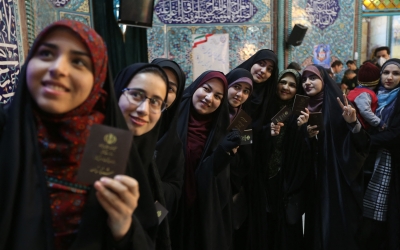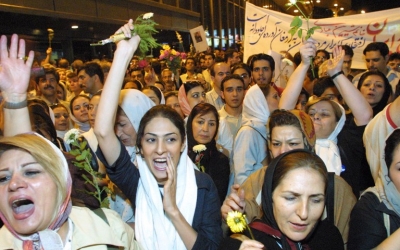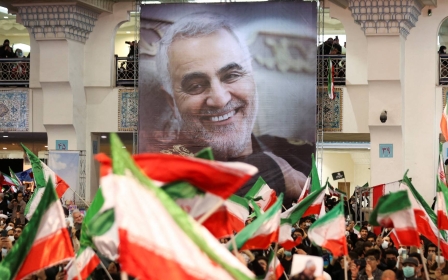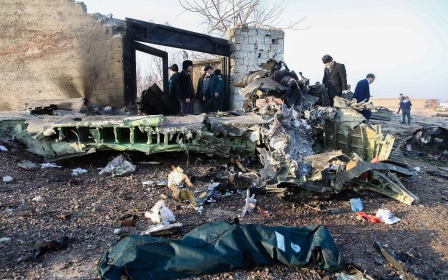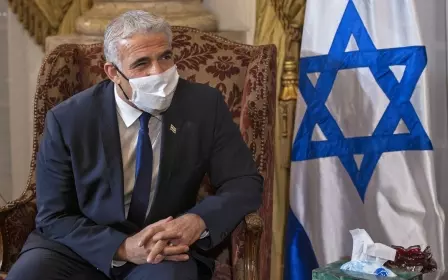Iranian press review: Isfahan bans bodybuilding for women
Iranian province bans women's bodybuilding
A sports official in Iran's Isfahan province has sparked outrage after a new decree banning women from all bodybuilding activities.
A letter signed by Mohammad Tabatabaei, a deputy to the sports minister in Isfahan province, sent to the bodybuilding authority in the province last week read: "[In the field of bodybuilding] any activity by women, such as holding competitions, organising training camps, and coaching and referee courses are illegal until further notice."
Since 2014, Iranian women have been allowed to participate in national and international bodybuilding competitions, as well as coaching and referee courses.
In response to the Isfahan ban, which does not apply to the rest of the country, many Iranians took to social media to show their discontent.
Azadeh Mokhtari, an Iranian journalist, criticised the authorities for using their power to impose restrictions on women while the country suffers from various social and economic crises.
"Apparently, you are blind, and you don't see the homeless, the addicts, the poverty, inflation and … you can't see these pains and all you can do is to unveil a new stupid - but bitter – matter for the people," she wrote on Twitter.
The current ban came into effect five months after the hardline president Ebrahim Raisi took office, worrying athletes that the new government would impose more restrictions on women's sports.
Fertility treatments to boost population growth
As part of a new government plan to fight against the ageing of the Iranian population, fertility treatments, as well as In Vitro Fertilisation (IVF) and Intrauterine Insemination ((IUI) treatments, will be covered by public insurance in Iran.
The Javan daily reported that couples who need an IVF treatment would receive $240 in aid from the government. In addition, the pairs could receive the same amount three times per year.
According to the daily, the expense of IVF treatment in public hospitals is about the same as the support the government gives, adding that in private hospitals, charges for the same treatment could cost as much as $410.
Mehdi Nasehi, the director of Iran's public insurance organisation, told the daily that since March 2021, over $2.4m was provided to couples who needed IVF treatment.
Official data show that one in every five Iranian couples faces fertility issues.
Following the warnings by the experts about Iran's rapid demographic ageing, the establishment has adopted new policies, including giving incentives for having kids and halting the free access to birth control surgeries.
In the 1990s, Iran had one of the youngest populations in the Middle East; however, the authorities' plan to provide free sterilisation for women and men severely impacted the country's birth rate.
Contract killings rise as economic crisis deepens
The number of criminals committing homicide to earn money in Iran has increased amid an economic crisis exacerbated by US sanctions, local media reported.
The Jameh 24 website, in an analysis of the past weeks' cases of murders, wrote that the primary motivation for hiring a killer in today's Iran was financial gain.
'We are witnessing an increase in the number of murders committed by contract killers'
- Jameh 24
"We are witnessing an increase in the number of murders committed by contract killers. This trend could lead to a phenomenon based on which any person would commit homicide for some money," Jameh 24 wrote.
In one of the cases scrutinised by the website, a woman hired a killer to kill her husband in return for $1,700. In another case, a son paid about $2,100 to two killers to murder his father over a financial dispute.
In a third case, a worker at a furniture workshop paid about $50 to two thugs to beat a rival worker, who made more money than him, but instead, the thugs killed the victim.
"When a large amount of money is offered to someone from the vulnerable section of society, they accept to murder to change their living conditions," the website concluded.
Land subsidence endangers cities and plateaus
Land subsidence caused by groundwater over-exploitation, water mismanagement and digging illegal wells has become a severe environmental problem in urban and rural parts of Iran.
According to the ISNA news agency, 480 out of 609 plateaus in Iran face the risk of severe land subsidence.
Meanwhile, the Khorasan daily reported that in the 12th district of Mashhad, Iran's second-largest city, the danger of land subsidence had crossed a hazardous level, putting citizens' lives in danger.
Hadi Sharifi, a provincial official, told local media that water overexploitation was the leading cause of the city's increasing cases of land subsidence.
In November, videos of a residential complex in Isfahan went viral, showing the complex was evacuated because of deep cracks that appeared on its walls due to land subsidence.
During the past decade, environmentalists have warned about potential widespread land subsidence due to water mismanagement in Iran; however, in 2021, for the first time, the depth of the phenomenon became evident in this arid country.
*Iranian press review is a digest of news reports not independently verified as accurate by Middle East Eye
Middle East Eye delivers independent and unrivalled coverage and analysis of the Middle East, North Africa and beyond. To learn more about republishing this content and the associated fees, please fill out this form. More about MEE can be found here.


